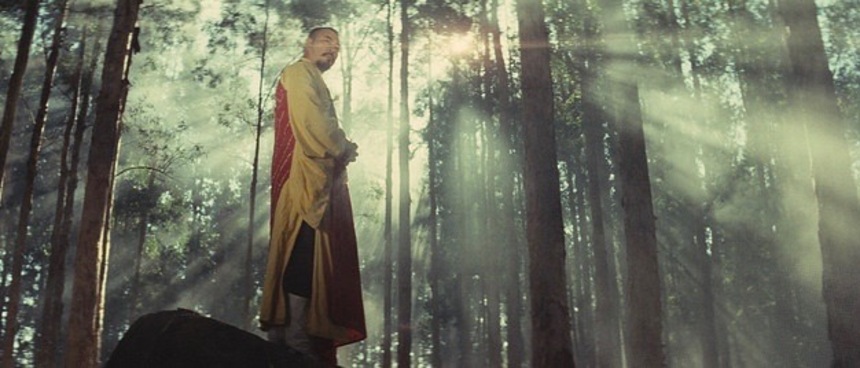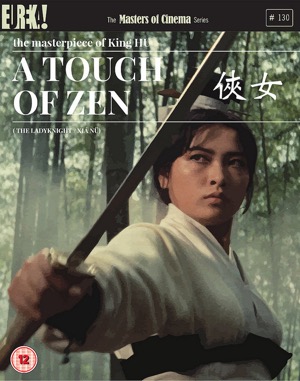Learning From The Masters Of Cinema: King Hu's A TOUCH OF ZEN

Heralded as possibly the greatest martial arts film ever made, King Hu's A Touch Of Zen stands apart from most other films in the wuxia genre. For one thing it runs over three hours long, a rarity among its peers and unheard of at the time of its release. In fact, A Touch Of Zen was so long that the producers balked at the idea of releasing it. Hu was constantly hounded throughout the lengthy production to shorten the film. When he objected, Hu's financiers at International Film Company (the production company set up specifically to make the film) went against the director's wishes and cut it in half, releasing A Touch Of Zen as two separate films.
Despite Hu's previous film, Dragon Inn (1967), being a massive hit throughout Asia, as Come Drink With Me (1966) had been before that, audiences were less than enthusiastic about A Touch Of Zen. Desperate to recoup the cost of the film's two-year production (nearly half of which was spent waiting for the central fort set to become sufficiently overgrown), a curtailed two-hour cut of the film was assembled and released in Taiwan in 1971. The response was no better. It would be another two years before Hu attempted to reconstruct his original epic vision, and when he did, audiences finally saw the brilliance of A Touch Of Zen. The film played at the Cannes Film Festival in 1975, where it won the Grand Prix for Technical Accomplishment, and now it arrives on blu-ray in a glorious new digital restoration overseen by L'Immagine Rittrovata in Bologna.
Curiously, even decades after Hu's director's cut of the film was released and widely revered, the old two-part version continues to circulate. I first saw the film around a decade ago, courtesy of a shoddy Tai Seng DVD, where it was presented in two parts, complete with two sets of opening credits. Part one ends after the climactic skirmish in a bamboo forest, followed by a tacked-on shot of the film's heroine Yang Huizhen (Hsu Feng) riding off into the distance. Part two begins with the exact same sequence again, although the parting shot is now absent (I don't think it appears anywhere in the final cut of the film).
That sequence in the bamboo forest, in which Yang intercepts the corrupt Eunuch Wei's soldiers using gravity-defying acrobatics and skilful swordplay, has become one of the film's most celebrated scenes. At the time, audiences would not have seen such a complex sequence staged in a cluttered location like this - the lack of space for one reason - but it has since inspired similar sequences in films like Ang Lee's Crouching Tiger, Hidden Dragon (2000) and Zhang Yimou's House Of Flying Daggers (2004).
As David Cairns highlights in his video essay accompanying Masters of Cinema's release of A Touch Of Zen, events leading up to this encounter are noticeably devoid of action - a risky approach for a wuxia film. The first half of the film introduces a number of disparate characters, all of whom gravitate towards the ruins of an old fort. There they cower and hide, while Hu toys with his audience, offering up spooky atmospherics rather than thrilling action. Hu further subverts audience expectation by casting Shi Jun - the almost impossibly capable warrior from Dragon Inn - as the distinctly unheroic scholar Gu Shengzhai.

As with his previous films, Hu again casts an upcoming young female martial artist as the principal warrior in his film. Following in the footsteps of Cheng Pei Pei in Come Drink With Me and Shangguan Lingfeng in Dragon Inn, Hsu Feng plays the fugitive Yang, who is to be executed by Eunuch Wei after her father informed against him to the Emperor. Yang and Gu, who proves himself a brilliant military tactician despite his physical failings, form an alliance against Wei and his men. A romance blossoms between the couple, but they are ultimately reduced to bystanders as their struggle evolves into a more spiritual and metaphysical conflict.
As the film's title might suggest, A Touch Of Zen becomes increasingly focused on Buddhism and the strength of higher powers as it journeys towards its psychedelic head-trip of a finale. The film's final showdown does not involve Yang or Gu, but is instead between the Eastern Group's new commander, Xu (Han Yingjie) and Yang's mentor, the Buddhist Abbot Huiyuan - played by Roy Chiao, best known in the West as Lao Che from Indiana Jones And The Temple Of Doom.
A Touch Of Zen is also chock full of quirky narrative details - Gu's elaborate plan to booby trap the fort and fool a troop of soldiers into believing it is haunted; the abbott bleeding gold to highlight his enlightened state; Yang and Gu's bizarre affair that leaves Gu to care for this infant child while she advances her training. Despite the film's climactic touch of zen, Hu was quick to point out that "I'm not a Buddhist myself, and the film I made has no didactic or missionary intentions. What interests me is capturing the flavour of an experience."
Regardless of Hu's intentions, A Touch Of Zen is a radiant piece of filmmaking that captures the natural beauty of Taiwan (and parts of China, apparently) through stunning cinematography and dextrous camerawork. Though stylistically very different to his previous films - more classical in tone, less reverent to Western influences - A Touch Of Zen is nevertheless the pinnacle in the career of a filmmaker obsessed with the technical possibilities of the art-form.
The Masters of Cinema's new three-disc dual-format release is limited to 3000 copies and boasts some excellent supplements to complement the exemplary presentation of the film. Asian film expert Tony Rayns provides an excellent selected scene commentary to the film, while David Cairns' aforementioned video essay Golden Blood is as informative as it is entertaining. The release also includes the 47-minute documentary King Hu 1932-1997,which boasts a raft of great insights and interviews about the director and his career, as well as a 36-page booklet containing writing from King Hu and Tony Rayns, and Pu Songling's short story The Magnanimous Girl, which was a key inspiration for the film.
A Touch Of Zen is available on dual-format Blu-ray/DVD in the UK from Eureka! Entertainment now.

Do you feel this content is inappropriate or infringes upon your rights? Click here to report it, or see our DMCA policy.






